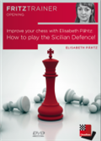15-year-old Grandelius in second place
 Nigel Short's achievements as a chess professional are nearly countless. The 54-year-old grandmaster currently serves as Vice-President of FIDE, although he never completely quit competitive chess. After earning the GM title at the age of 19, the man born in Leigh climbed to the pinnacle of the chess world, getting to face Garry Kasparov in the 1993 PCA World Championship match, after overcoming Anatoly Karpov and Jan Timman in direct matches.
Nigel Short's achievements as a chess professional are nearly countless. The 54-year-old grandmaster currently serves as Vice-President of FIDE, although he never completely quit competitive chess. After earning the GM title at the age of 19, the man born in Leigh climbed to the pinnacle of the chess world, getting to face Garry Kasparov in the 1993 PCA World Championship match, after overcoming Anatoly Karpov and Jan Timman in direct matches.
Short achieved his peak rating in April 2004 and joined the "2700 club" for the last time in 2012. Currently rated 2626, he is only 23 points shy of belonging to the world top 100, despite having decided many years ago to participate exclusively in tournaments that provide attractive conditions for players — i.e. Gibraltar, Bangkok, Isle of Man and Malmö, among others.
 Nigel Short takes us on an electrifying journey through a very rich chess career, which saw him beat no less than twelve world champions. His experience in tournaments and matches all over the world – Short has visited a total of 89 countries – can be seen in the narratives that precede the games which he annotates with humour and instructive insights.
Nigel Short takes us on an electrifying journey through a very rich chess career, which saw him beat no less than twelve world champions. His experience in tournaments and matches all over the world – Short has visited a total of 89 countries – can be seen in the narratives that precede the games which he annotates with humour and instructive insights.Back in 2009, after winning the Sigeman & Co Tournament for a second time — he also won in 2002 and would later get his third triumph in 2013 —Mig Greengard wrote in his Daily Dirt Chess Blog:
As long ago as 2000 [Short] told me he much preferred playing in nice conditions and having fun on and off the board instead of bashing and being bashed in elite events. It does sort of make you wonder how well the former world championship challenger might do were he to get back to the grind.
Eleven years later, we still sort of wonder...
Short was the top seed that year, followed by the ever-sharp Ivan Sokolov, top Finish star Tomi Nybäck and a Swedish trio formed by Tiger Hillarp-Persson, Emanuel Berg and Nils Grandelius. Five of the participants had a rating above 2600, except 15-year-old Grandelius (rated 2491 at the time), who proved his worth by getting sole second place.
Fifteen games were played in the single round-robin, with only five of them ending up drawn. As Frederic Friedel pointed out in his final report back in 2009, the method used in Malmö to combat draws is perhaps still one of the most effective:
Instead of forbidding draw offers, counting wins and draws differently, and the many other methods proposed by experts, you can also solve the problem by simply inviting the right players.

A good mix of fighting players: Emanuel Berg, Nils Grandelius, Ivan Sokolov, Tomi Nyback, Tiger Hillarp Persson and Nigel Short | Photo: Official site
Short's best-looking wins
The short sprint in Malmö saw Short winning four of his five encounters. His one draw came in round four, when he split the point with Hillarp-Persson. In round one, he outplayed Berg positionally from a middlegame with opposite-coloured bishops. Already under heavy pressure, the Swedish grandmaster blundered:
Berg's 38...Qa7 lost immediately to 39.c7, threatening mate on e8.

Smiling — Nigel Short | Photo: Official site
Facing the creative Grandelius in round three, Short went on the attack from the white side of a Sicilian Defence:
 The continuous stream of new ideas in the Sicilian makes 1..c5 the most popular answer to 1.e4. On this DVD I do give an introduction to the most important Sicilian systems.
The continuous stream of new ideas in the Sicilian makes 1..c5 the most popular answer to 1.e4. On this DVD I do give an introduction to the most important Sicilian systems.
Things went south quickly for Black after 18.Nf5 gxf5 19.Rxf5 d5 20.exd5, with the decisive mistake being 20...Qb4:
There was no way out for Grandelius after 21.Bh6 Qb6+ 22.Kh1 Nh7 23.Bxg7 Kxg7 24.Rd4, bringing the second rook to the attack.

A dreadlocked Nils Grandelius talking with Nigel Short | Photo: Official site
Against the aggressive Sokolov in the final round, Short chose a rather cautious approach with the black pieces, allowing his opponent to get the initiative, eventually gaining a pawn and showing good technique to convert his advantage:
The British grandmaster correctly played the timely 35...d5 here, later gaining an exchange and scoring a closing 54-move victory.
All five games played by Short
Final standings

The new Opening Encyclopaedia offers fast access to all openings. Openings are sorted via the menu by name & ECO Code for fast and easy access to your favorite openings.
All games
Links


















 Nigel Short's achievements as a chess professional are nearly countless. The 54-year-old grandmaster
Nigel Short's achievements as a chess professional are nearly countless. The 54-year-old grandmaster 




